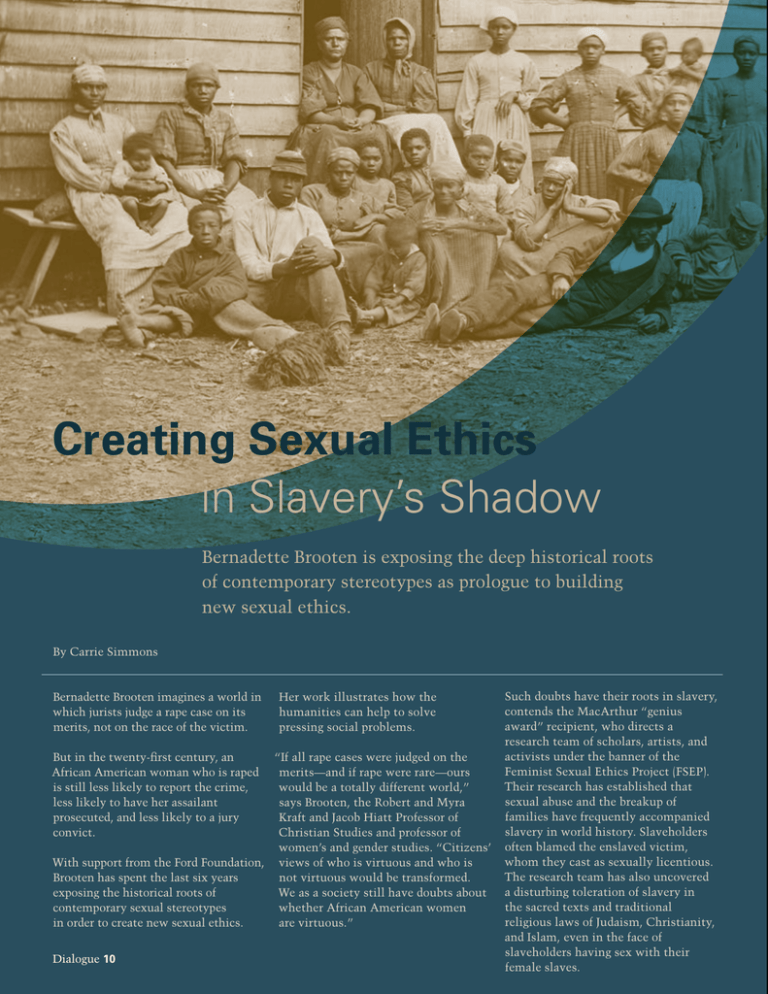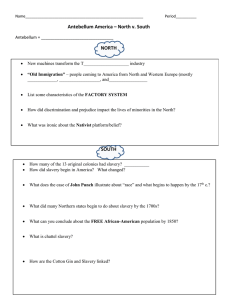
Creating Sexual Ethics
in Slavery’s Shadow
Bernadette Brooten is exposing the deep historical roots
of contemporary stereotypes as prologue to building
new sexual ethics.
By Carrie Simmons
Bernadette Brooten imagines a world in
which jurists judge a rape case on its
merits, not on the race of the victim.
Her work illustrates how the
humanities can help to solve
pressing social problems.
“If all rape cases were judged on the
merits—and if rape were rare—ours
would be a totally different world,”
says Brooten, the Robert and Myra
Kraft and Jacob Hiatt Professor of
Christian Studies and professor of
women’s and gender studies. “Citizens’
With support from the Ford Foundation, views of who is virtuous and who is
not virtuous would be transformed.
Brooten has spent the last six years
We as a society still have doubts about
exposing the historical roots of
whether African American women
contemporary sexual stereotypes
are virtuous.”
in order to create new sexual ethics.
But in the twenty-first century, an
African American woman who is raped
is still less likely to report the crime,
less likely to have her assailant
prosecuted, and less likely to a jury
convict.
Dialogue 10
Such doubts have their roots in slavery,
contends the MacArthur “genius
award” recipient, who directs a
research team of scholars, artists, and
activists under the banner of the
Feminist Sexual Ethics Project (FSEP).
Their research has established that
sexual abuse and the breakup of
families have frequently accompanied
slavery in world history. Slaveholders
often blamed the enslaved victim,
whom they cast as sexually licentious.
The research team has also uncovered
a disturbing toleration of slavery in
the sacred texts and traditional
religious laws of Judaism, Christianity,
and Islam, even in the face of
slaveholders having sex with their
female slaves.
Bernadette Brooten
“Sexual ethics needs history. Slavery
corrupts the moral fabric of society,
including its sexual morality. Past
toleration of slavery still shapes our
moral imagination and our individual
ethical decisions. In order to heal from
the past, we need to confront it,” says
Brooten. “Antebellum U.S. slavery
continues to cast its shadow. Our
racism is sexualized, and our sexuality
is racialized.”
profiting from the slave trade, and
some U.S. Christian denominations
have urged passage of a bill put forth
by Illinois congressman John Conyers
authorizing a congressional study
of reparations for slavery.
Judaism and Islam also continue to
live with the effects of past toleration
of slavery. For example, early rabbis
and early Muslim jurists distinguished
between slavery and marriage, and
yet used the language of slavery to
describe marriage. In rabbinic sources,
a free wife, like an enslaved person,
is “acquired.” In Islamic religious
texts, male “authority” or “dominion”
applies both to slavery and marriage.
During U.S. slavery, slaveholders,
in an effort to increase their wealth,
pressured enslaved women to give
birth frequently. But even after slavery,
whites sought to control African
American reproduction, this time
by limiting it through targeted birth
control and forced sterilizations
“I am encouraged that a small group
during the eugenics movement.
of thoughtful Christians, Jews, and
Muslims are looking at this history,
“Echoes of that mindset remain,”
acknowledging where things went
Brooten says. “Although the majority
wrong, and rethinking how we
of people who receive welfare benefits
view sacred texts and think about
are not African American, the general
sexuality,” says Brooten.
public pictures welfare recipients as
sexually irresponsible black teenage
girls and women.
Last fall, the FSEP team presented its
research results to overflow crowds
at a major public conference held at
Brandeis. “Beyond Slavery: Overcoming
Its Religious and Sexual Legacy,”
included speaker Mende Nazer, a
Sudanese woman who herself escaped
contemporary slavery. Brooten is editing
a volume based on that conference
and is writing a book on early Christian
women who were enslaved or who
were slaveholders.
“We can create a world in which owning
or controlling another person’s body,
whether as a worker or a wife, is
impossible to imagine,” she says.
For more information, see the
project’s Web site:
www.brandeis.edu/projects/fse/.
Nineteenth-century
freedom medallion
Roman matron surrounded by enslaved women.
“Such distortions pose a moral problem
to the nation at large and to Christians
in particular. Christians cannot
simply claim that we used to tolerate
slavery, but that we no longer do,”
says Brooten. Although early Christian
leaders knew that enslaved women
were sexually vulnerable to their
owners, they did not penalize Christian
slaveholders in the New Testament
or in canon law for having sex with
their slave women.
Recently, some religious
denominations have begun to
examine the connection between
religion and slavery. The Church
of England apologized in 2006 for
Dialogue 11


